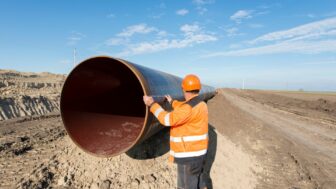Studies show fracked natural gas is as bad as coal for the climate
RICHMOND—Dominion Resources today filed its federal application to build the proposed Atlantic Coast Pipeline, the first of four proposed gas pipeline projects in Virginia. The Chesapeake Climate Action Network is calling on the Federal Energy Regulatory Commission (FERC) to fully assess the cumulative harm this project would inflict on the climate as part of its environmental review.
FERC is now charged with preparing an Environmental Impact Statement for Dominion’s proposed $5 billion, 564-mile pipeline from West Virginia, across Virginia, to North Carolina. This review must account for the many dangers the pipeline poses to public health and safety, the environment and the climate—as well as readily available alternatives to a pipeline, such as solar, wind and energy efficiency.
Mike Tidwell, director of the Chesapeake Climate Action Network, had the following statement:
“Dominion’s pipeline threatens to unleash a huge new pulse of greenhouse gas pollution. To do its job, FERC must assess the pipeline’s cumulative impact on the climate, including leaks of heat-trapping methane and other greenhouse gases from fracking wells, compressor stations, and all 564 miles of pipeline.
“Numerous studies show fracked gas disrupts the climate on par with coal. That’s because methane is 86 times more potent of a greenhouse gas than carbon dioxide over a 20-year period. It’s frankly sad that Dominion and Governor Terry McAuliffe continue to trumpet this project as ‘clean’ when it’s for a volatile, planet-heating fossil fuel.
“Thankfully, Virginia has plenty of clean energy alternatives to building a 564-mile pipeline, and FERC is legally obliged to consider them. For instance, if Dominion invested its $5 billion in solar power instead of a dangerous pipeline, we could install enough solar panels to power over 400,000 Virginia homes. Installing and maintaining this industry would create 2,500 temporary construction jobs and support 216 permanent jobs annually, plus additional jobs due to lower energy prices over time, and improved health outcomes of workers across the state.[1]
“FERC, Dominion, and Governor McAuliffe must wake up to the reality that we can and must meet our energy needs without jeopardizing Virginians’ homes, health and climate.”
The Atlantic Coast Pipeline is one of four interstate gas pipeline projects currently proposed for the central Blue Ridge and Appalachian Mountain region of Virginia and West Virginia—along with the Mountain Valley Pipeline, the Appalachian Connector Pipeline, and the WB Xpress Project.
CCAN is also joining landowner and environmental groups in calling on FERC to prepare a Programmatic Environmental Impact Statement for all four pipelines in order to fully evaluate the direct, indirect, and cumulative impacts of pipeline development in this region.
Contact:
Kelly Trout, 240-396-2022, kelly@chesapeakeclimate.org
Monique Sullivan, 202-440-4318, monique@chesapeakeclimate.org
1. Solar power and jobs data is based on U.S. Energy Information Administration data and National Renewable Energy Laboratory modeling.
###
The Chesapeake Climate Action Network is the biggest and oldest grassroots organization dedicated to fighting climate change in Virginia, Maryland, and Washington, D.C. We’re building a powerful movement to shift our region away from climate-harming fossil fuels and to clean energy solutions.





